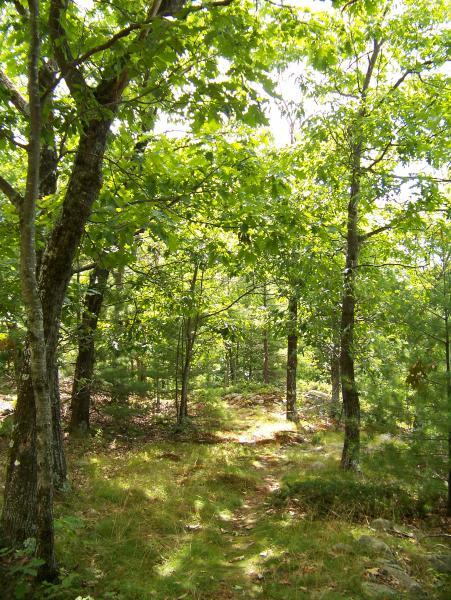Landowners Working for Whip-poor-will
Nanci and Charlie Mitchell - Gilmanton, NH. Nanci and Charlie Mitchell live on a large tract of land in Gilmanton which they manage largely to protect and improve wildlife habitat on the property. Recently, they went the extra step of conserving the majority of it with help from the Forest Society. Nancy and Charlie took risks and bold steps along the way, and in the process, have helped wildlife in the area immensely. Among the most notable of their recent activities was purchasing an adjacent 360-acre parcel abutting their land on Swett Mountain. Nancy and Charlie didn’t stop there, however. They’ve embarked on active habitat improvement work and have welcomed others to experience their land by hosting hikes and tours. They’ve kept track of how wildlife uses their property and seeded eroded roads and trails to protect water quality and the roads and trails themselves.
Most recently, the Mitchells completed a wildlife habitat improvement project to create early successional habitat to maintain habitat for Whip-poor-wills, a species that nests on their land.
The Whip-poor-will is listed as a species of concern in the NH Wildlife Action Plan. It requires areas of dry soils and open understory, especially in pine and oak woodlands. (Wildlife Action Plan Appendix A, Part 5, Birds). The Wildlife Action Plan states that, “Anecdotal accounts over much of the Northeast suggest a consistent decline in whip-poor-will populations." The WAP also notes, “Because the bulk of New Hampshire’s whip-poor-will population occurs in the rapidly developing southern part of the state, the species is at high risk of losing habitat to development.” On the Mitchell’s land, however, this threat no longer exists and they’re working on restoring some habitat for the species. They’re also planning a project to enhance woodcock habitat in a wetter section of their forests, in an old clear cut.

Nanci explains her motivation to conserve habitat this way: “I’ve been interested in wildlife since I was a child. I enjoy following tracks and watching the birds. Since we own something special, we feel a responsibility to care for it and nurture critters that could live here. Habitats like these are decreasing at an alarming rate.” She notes that she’s “learned a lot about the importance of early successional growth and large blocks of land, and I try to keep learning.”
For their extraordinary conservation efforts, the Society for the Protection of New Hampshire Forests named the Mitchell’s their 2007 Conservationists of the Year, presenting the award to the couple at the group’s 2008 annual meeting.


